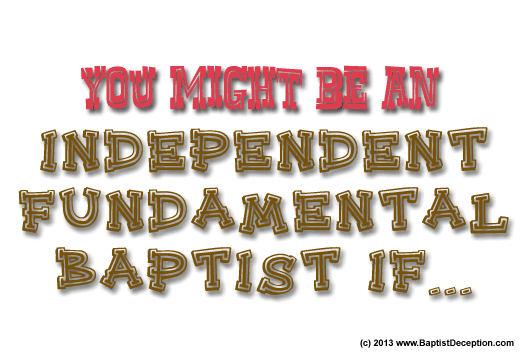
One of the common search phrases that brings people to this site is What is an IFB Church? Here’s my answer to this question.
I stands for Independent
The local, visible church is an independent body of believers who are not associated or affiliated with any denomination. The pastor answers only to God, and to a lesser degree the church. The church answers to no one but God. Most IFB churches oppose any form of government involvement or intrusion into its affairs. While some IFB churches have deacon boards or elders, almost all of them have a congregational form of government.
F stands for Fundamentalist (or Fundamental)
The independent church is fundamentalist in its doctrine and practice. IFB churches are social and theological fundamentalists (see Are Evangelicals Fundamentalists?). Fundamentalists adhere to an external code of conduct. Often this code of conduct is called “church standards.” The Bible, or should I say the pastor’s interpretation of the Bible, is the rule by which church members are expected to live. IFB churches spend a significant amount of time preaching and teaching about how the pastor expects people to live.
IFB churches are also theological fundamentalists. They adhere to a certain and specific theological standard, a standard by which all other Christians and denominations are judged. Every IFB pastor and church believes things like:
- The inspiration, infallibility, and inerrancy of the Bible
- The sinfulness, depravity of man
- The deity of Christ
- The virgin birth of Christ
- The substitutionary blood atonement of Christ for human sin
- The resurrection of Christ from the dead
- The second coming of Christ
- Separation from the world
- Salvation is through Christ alone, by grace, through faith
- Personal responsibility to share the gospel with sinners
- Heaven and Hell are literal places
- Saved people go to Heaven, unsaved people go to Hell
- Hierarchical authority (God, Jesus, church, pastor, husband, wife)
- Autonomy and independence of the local church
I am sure other doctrines could be added to this list, but the list above is a concise statement of ALL things an IFB church and pastor must believe to be considered an IFB church.
B stands for Baptist
IFB churches are Baptist churches adhering to the ecclesiology and theology mentioned above. Some IFB churches are landmark Baptists or Baptist briders. They believe the Baptist church is the true church and all other churches are false churches. John the Baptist baptized Jesus, which made him a Baptist, and the first churches established by the Baptist apostles were Baptist churches. Churches like this go to great lengths to prove that their Baptist lineage dates all the way back to John the Baptist, Jesus, and the Apostles. (See The Trail of Blood by J.M. Carroll.)
Other IFB churches and pastors believe that Baptist ecclesiology and theology are what the Bible clearly teaches. They grudgingly admit that other denominations “might” be Christian too, but they are quick to say, why be a part of a bastardized form of Christianity when you can have the real deal.
Some Southern Baptist churches are IFB. They are Southern Baptist in name only. It is not uncommon for an IFB pastor to pastor a Southern Baptist church with the intent of pulling it out of the Southern Baptist Convention. Because of this, Southern Baptist churches frequently reject resumes from pastors with an IFB background. Area missionaries warn churches about pernicious IFB pastors who desire to take over churches and pull the churches out of the Convention.
Other posts about the IFB
Let’s Go Camping: Understanding Independent Fundamentalist Baptist Camps
Tony Soprano Would Make a Good Independent Baptist Preacher
Independent Fundamentalist Baptist Lingo:A Guide to IFB Speak
IFB Doctorates: Doctor, Doctor, Everyone’s a Doctor
The Jonathan Nichols Story: Growing Up Gay in the IFB Church
An Independent Baptist Hate List
The Official Independent Baptist Rulebook
From Evangelicalism to Atheism Series
Bruce Gerencser, 68, lives in rural Northwest Ohio with his wife of 47 years. He and his wife have six grown children and sixteen grandchildren. Bruce pastored Evangelical churches for twenty-five years in Ohio, Texas, and Michigan. Bruce left the ministry in 2005, and in 2008 he left Christianity. Bruce is now a humanist and an atheist.
Your comments are welcome and appreciated. All first-time comments are moderated. Please read the commenting rules before commenting.
You can email Bruce via the Contact Form.
